Experiencing Jordan Food Shock
This article may contain affiliate links where I make a small commission for purchases you make from links that you click from this article. By purchasing through these links, you support me at no additional cost to you. Thanks for your support.
I sat on the couch and my stomach grumbled wondering why in the hell I hadn’t given it anything but a thin piece of bread, oil, thyme, and an abundance of coffee for the last 6 hours. My body was quickly learning that Jordan’s food portions were not quite as large as I was used to.
My stomach was angry at me, it was calling out to me wondering why I was torturing it. This is the normal time of day when I feed it a sandwich followed by a Diet Coke, some chips, and of course some sort of cookie or sweet; but instead, it received nothing.
I actually lost weight in Jordan thanks to the food and the cultural food habits of Jordanians. Gone were my bad habits of snacking on sweets, or grazing while I worked. Gone were the days of me controlling my schedule of when or what I was going to eat; when living with a local family you are at the mercy of how they run their household.
This left me in hunger pains at times as I went through the process of “food shock”. It’s not much different from culture shock; it’s physical, emotional, and painful at times! Just as one adjusts to culture shock or re-entry shock when traveling, your body and mind also have to adjust to food shock.
Table of Contents
Eating Times in Jordan
In America we generally eat 3 standard meals a day at 8 AM, noon-ish, and 7 PM; they are about equal in size. There are normally some snacks in the afternoon too. However, in Jordan, the eating times seem to vary quite a bit with my host family. We had a very small breakfast of bread, oil, za’atar, and Happy Cow cheese around 8 AM. Then there was a very long wait until lunch around 3:30 PM. Lunch is normally the largest meal of the day with rice, chicken, and bread.
The rest of the day was sort of a free-for-all; I never really knew when I would eat again or what it might be. It might be some leftovers from lunch or maybe one of the kids would go out and bring back shwarma around 9 PM, or sometimes there was some babaganoush-type dip or I’d make myself a cheese and tomato pita sandwich. And when I say cheese, tomato, and pita – that’s exactly all there was. Don’t get visions of lettuce, mayo, mustard; it’s definitely no American-type sandwich.
It seemed to be either feast or famine – and Jordanians were used to that, but I wasn’t! Some days there would be huge amounts of food provided to me, and some days there was very little. I never knew what to expect! I certainly didn’t starve, but I did struggle with the uncertainty.
After a week of trying to understand the eating schedule and frequent hunger pains, I finally learned when food was put in front of me – I should eat as if I wasn’t going to eat again that day! I had to really train myself to accept the fact I wasn’t in control of when I was eating, the portions, or what I was eating…this is the Food Shock process. Instead I (and my stomach) learned to appreciate it whenever I had food and ate whatever was made in satisfaction.
Discover the food of Lebanon
Jordan Food Oddities
During my month in Jordan, I witnessed many things about food and eating that was culturally foreign to me…and quite frankly odd. I found them amusing and consistent throughout Jordan.
Rarely do Jordanians use utensils. They had one primary utensil – and that was bread. It’s fascinating to watch a Jordanian eat; they rip off a piece of bread/pita and then will pinch the food up with the bread. Imagine if you had just killed a bug on the floor and you wanted to pick it up and throw it away. You get a Kleenex and pinch it up off the floor. It’s the same idea – but you put the whole piece of bread and pinched-up food into your mouth! In addition to pinching the food, they also scooped the food up with bread as if it were a shovel.
They tried to teach me numerous times how to quickly fold the torn piece of bread into a spoon-like form and then scoop. Many times you took another little ripped piece of bread to push the food into the scoop. Eventually, I got used to this, and the fact that there were few utensils to wash was a nice by-product of the food culture!
Drinks are really separate from eating. You could sit down and have a whole huge feast and no one would have a glass in front of them (except me of course!). After the eating was finished, they would get water, coffee, or tea. I am used to the process of eating a little, drinking a little, eating a little, drinking a little…so I found this drinkless eating hard to get used to, but fairly easy to remedy!
Meat has a different meaning in the Middle East. I learned this when I was eating chicken and rice with the family and Rawan asked me, “Do you eat meat?” I looked at her somewhat confused and repeated, “Do I eat meat?” as I was pinching up a piece of chicken with my bread. “Yes, of course, I eat meat.” After a bit more clarification I learned meat is only considered beef, lamb, and goat. Chicken is different and is not considered meat. Important to know if you are vegetarian.
Finally, a meal consisted of one dish and bread. There rarely were different choices with a variety of vegetables or side dishes.
My Favorite Jordan Foods
I did find some food that was definitely new to me and unique to Jordan and the Middle East. Then I also found familiar food such as bread – but the quantities and types of bread consumed were new to me! I of course tried all the food, but here were some of my favorites
Lamb Brain – I ate it…every delicious last bite of it! It was served with lemon sauce and pine nuts and yes, it looked like a brain. However, it tasted more like pate and was eaten with bread of course!
Pickled Everything – It seems that Jordanians eat pickled products like we eat potato chips. At every meal, there was normally a little plate of picked olives, turnips, and carrots which people munched on as a side dish.
Spices – I loved Jordanian cooking because they used spices on a daily basis that we seem to leave for only certain types of food; specifically – cinnamon. Cinnamon and other ‘autumn-like’ spices were used in everyday cooking. Cardamom and nutmeg or cloves were also frequently used in main dishes. But one of my favorite new tart spices was sumac; put it on fried cauliflower and it was heaven. However, the king of spices devoured in great quantities in Jordan was thyme. It wasn’t simply thyme, but a special mixture of thyme, sesame seeds, sumac, and salt called Za’atar. There were whole stores dedicated to Za’atar mixtures. Typically it was eaten with bread…no surprise there. You dip your bread in olive oil and then dip it in the Za’atar; eaten at breakfast, dinner, or any time of the day.
Happy Cow Cheese – this familiar brand of soft processed cheese is found everywhere in the Middle East. It’s a staple item and used much like butter is for us. One of my favorite new things to snack on is pita bread with smeared Happy Cow cheese and apricot jelly; a quick sandwich snack.
Beans – you’ll find beans as a main staple in Jordan dishes – however more often they are not in bean-like form, but they are blended smoothly so that you don’t even know you are eating beans! My favorite bean dishes were of course falafel, foul, and hummus.
After introducing all of this Food Shock into my system, the family graciously accepted my offer to make them an American meal one day. I decided on a menu of chicken casserole (complete with macaroni, processed cheese, and cream of mushroom soup), a salad, cauliflower, and a homemade pan of chocolate brownies! And of course, I made sure everyone had a beverage in front of them when we ate too!
More about Jordan Food and Culture
Learn more about the drinks in Jordan – Minimalistic Beverages
The best sandwich I had in Jordan – Late Night Cravings
The best hummus and falafel I had in Jordan – Hummus Man at Hashem
Bread Culture – The Fabulous Baker Boys
Some Favorite Cooks I met in Jordan:
What’s your favorite food in Jordan?

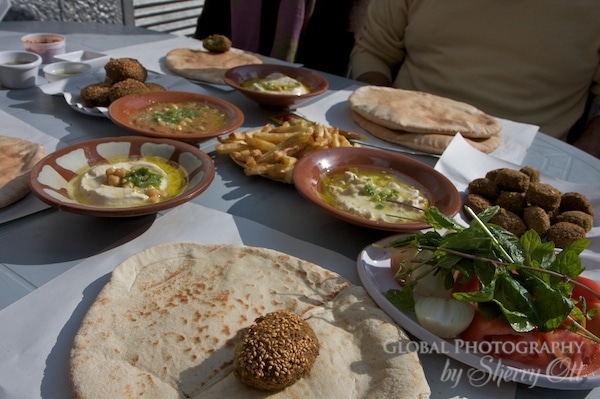
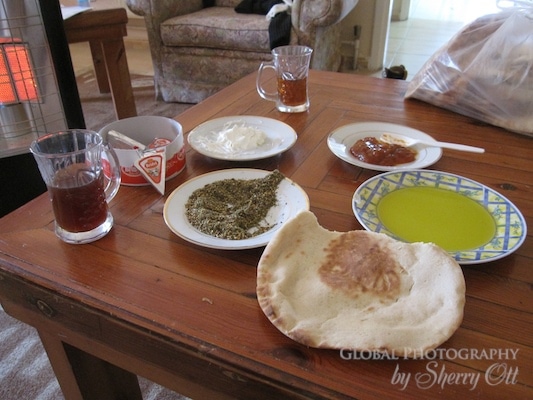
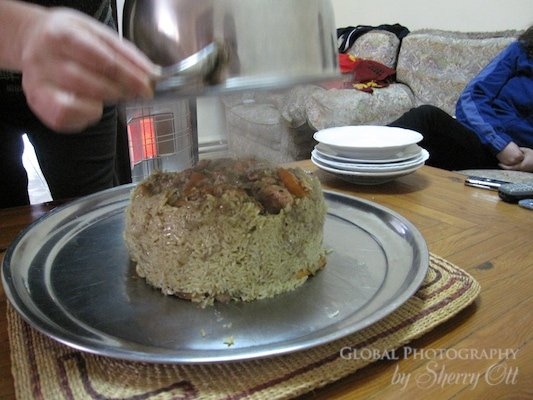
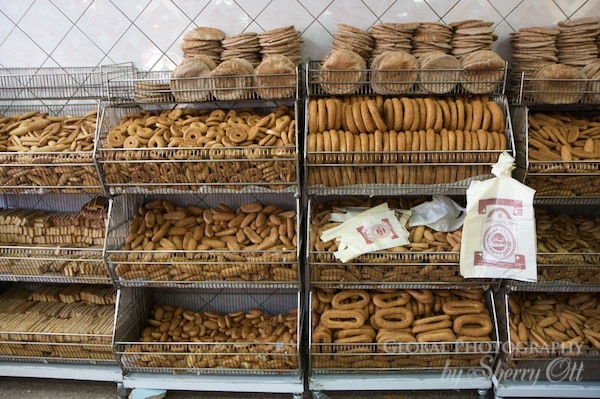
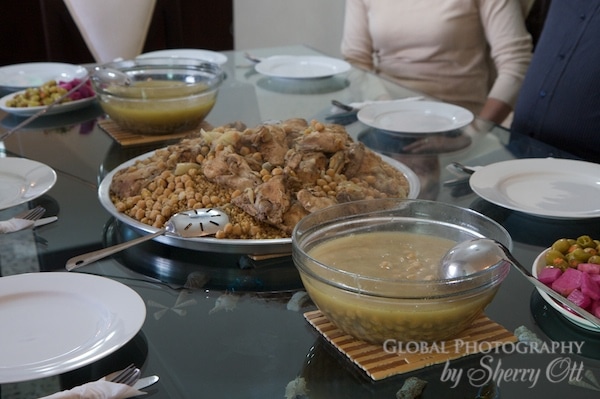
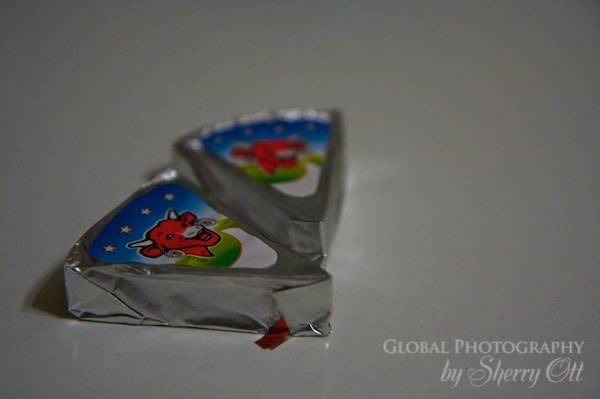
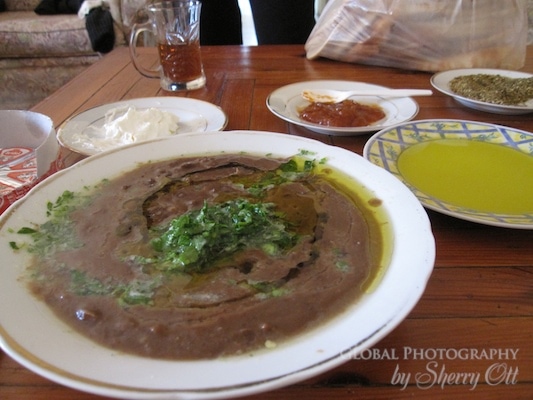

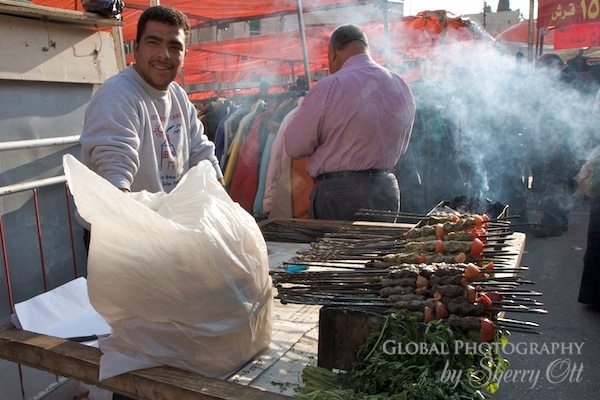
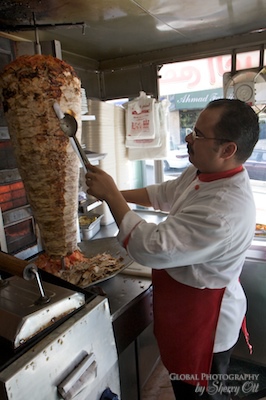






Great post! But isn’t it great to be out of your comfort zone?! I love that feeling! I actually felt some ‘food shock’ in the USA when we were there for a month for Grantourismo this year – our first trip in 17 years. The portion sizes astonished us, and the greasiness and cheesiness of fast foods, especially burgers and hot dogs.
The food is similar right across the Middle East, with some slight variations. I love it! I love that lunch is the biggest meal of the day – it’s the same in most Mediterranean countries in Europe too as you probably know: light breakfast, big lunch, light late dinner. I’ve been eating that way for so long now that I’m used to it and that’s how I prefer to eat now, although, as you know, it’s impossible to have any routines when travelling. Hashem is the best, isn’t it?! A legend!
A you heading to Syria and Lebanon? The food is far better there, esp. Syria, than Jordan.
I’m actually in Lebanon right now! I’m here for the month of Feb – and yes I’ve been enjoying the food very much. The host family I am staying with in Lebanon isn’t as much of a cooking family as my one in Jordan though…so I’m not getting a huge variety of dishes – but the ones I’m eating are delicious! Love the mezze’s though…they are my favorite!
Sherry, what are you doing in Lebanon? How long are you there and where are you off to next? Do let me know if you need contacts. We’ve been travelling to Lebanon and writing about it and know the country intimately (Syria too, if you’re heading there), and have so many friends there, so happy to connect you with people from all different walks off life if you have time. If not, just enjoy! Amazing people!
Mmm, I just devoured this post. 😉 Learning about different food cultures is really fascinating, and you provided so much information here! The uncertainty of meals (when or how much) sounds hard to get used to, but I guess it would help you really start to appreciate each meal.
Absolutely – I did appreciate each meal as I never knew what and when it was coming next! It’s a whole different way to look at food and eating – a good exercise for me!
You brave woman eating Lamb brain. I would eat it too. When it’s offered up, I kindly accept. We have come to the conclusion that Laughing Cow is found in every corner of the earth. But have you noticed that it is starting to get expensive? I can’t believe the prices of it now, it used to be my old stand by for when I needed a cheese fix:) Eating definitely looks like it was quite the event in Jordan, I am so glad that you had an amazing time.
I have the same motto – I will eat it if it is offered to me. Sounds like we’ll get along find eating our way through the Mongol Rally! We’ll be sure to pack some Laughing Cow too! Maybe we can use it for bartering!
Very nice post. I like cook and taste different culture foods. After i try cook the same 🙂
The beginning of this post made me laugh – I’ve been through similar food shock situations when living with families in Estonia, Guatemala and Kyrgyzstan. There’s this awkwardness in that your stomach is growling but you don’t want to break any rules or feel rude about looking for food on your own. Sometimes, I’d be convinced that dinner wasn’t happening and would sneak off for a snack only to return to a full feast!
After being in Asia the last three months I’m really looking forward to Middle Eastern food. The bean dish (foul) looks delicious!
Yes – it’s always hard to be a guest in someone’s home – especially when you are hungry! I really find that travel keeps my weight in check. When I’m back in the US I eat Wayyyyy too much! Yes – when you are in the Middle east you must try foul. Hashem – the place with the good falafel downtown has good foul too. Hope you get to go there. Nothing fancy – so it may not be on your press trip. I got your note and will answer it this weekend! excited for your travels there!
Yum, yum, yum! I love foul, despite the spelling (in Europe it’s often sold as foul mesdames, which I think makes it even worse)…
We’ve found this also in Indonesia, that one doesn’t have the family meal, where all sit down together. We’re taught in the west that this is how to do things and grazing is somehow wrong.
Yet cultures that graze — like Thailand — often have the most delicious foods…
Thanks for sharing, anyway. I’m quietly drooling.
Foul was particularly yummy when it was super fresh. I would watch my host-mom make it and then she’d serve it up immediately for breakfast – she’d even give me my own plate of it – yum!
I became addicted to the Happy Cow/Laughing Cow cheese when we were in Spain. 😀
Being hypoglycemic I kinda have to graze throughout the day if I intend on not passing out. I wonder how this will affect me in other countries…
OMG, lamb brain? Shudder.
Yum-ME! It all sounds right up my alley…even the brain sounds good. Now i realize, I don’t think i ever tried that during my travels. What’s wrong with me? Something to look forward to. And i’m not joking.
I LOVE Za’atar!! I have some in my cabinet here in Chicago! My step-sister made this great Za’atar aioli w/ mayo and it’s sooooo good. Like the best dip ev-ah!
Eat some damn good falafel for me.
I’m surprised to hear that breakfast is the small meal of the day, but it’s also what I’ve found in much of the Arab world.
Growing up with huge Turkish breakfasts I can’t function without hundreds and hundreds of calories to start my day! Certainly my food shock 🙂
Hey Anil – having lived in the Arab world for 13 years and spent loads of time in Turkey and written books/stories on the place over that time, I have to clarify that the Turkish and Arab meals, including breakfasts, are very similar to each other in size, style and variety.
Breakfast in the Arab world tends to consist of labneh, olive, tomatoes, a cucumber, an egg maybe, foul, etc, just like in Turkey. Breakfast will vary slightly depending on where you have it, if it’s in a home or hotel and if it’s in a home, how wealthy those people are, or if it’s in a hotel, what budget that hotel is. And then personal taste also comes into play. In Abu Dhabi where we lived and I worked for many years, we ate a lot of Za’atar croissants.
To be honest, I don’t think the breakfasts in the Arab world or Turkey are small at all, and I’d actually say they’re quite large. Especially compared to many European breakfasts, except for English brekkies of course, however, they’re definitely small compared to the breakfasts we’ve seen in the USA, which are just ridiculously large, and way too much for us to eat, or even want to eat, so it’s all comparative really.
You would function very well on a typical breakfast in the Arab world, trust me! You’d love it!
Thanks Lara! That’s good to know, I’ll be making my way through Jordan and nearby soon. Ironically in Oman and Qatar I had trouble getting a feel for breakfast but would love to give it another go 🙂
Well, if they have shawarma, I won’t die of starvation. I could eat their bread, us Romanians eat LOTS of bread too, but most of their dishes are not something I’d like to have to eat. So, if I had to go there, I’d stick to shawarma 😀
Oh dear, I would not survive!! I NEED to eat at least 6 times a day – and I NEED to know when my next meal is coming!!
I’m starting a girl scout class on the 15th of Feb. Our first story is about a young girl in “Jordon”. The information on this website has helped me with my lesson plan
That’s wonderful to hear – I’m glad it was helpful and happy to hear it’s being shared with Girl Scouts – I was one a long time ago!
I’m dying to know what the family thought ofyour American meal.
My in-laws would get this amazing shawarma sandwich for me sometimes in Jordan, it had cheese in it!! It is sooooo gooooood. I love cheese. And I’ve never seen cheese with shawarma anywhere else I’ve been in the middle east. With the lack of evening meals I would make my husband buy me chips and snacks lol.
I really enjoyed this post, thanks for sharing such a detailed account of the cultural differences between us 🙂
I think I would’ve needed a snack or two to hold me over between the small breakfast and the late lunch though.
A lot of this information is incorrect. It seems that you had an experience with one family and decided that all jordanians are like this. This seems like the most stingy family in the entire kingdom of Jordan.
1. I am quite shocked that you said that you often did not eat past 3:30. Supper (around 8 or 9) is a standard meal. I never heard anyone not eating supper. If someone stops for a visit after 7 pm. and stays for a couple hours or more, it is considered very rude not to serve supper. Besides, when a guest is visiting, hosts tend to serve a lot of food, fruits, and snacks many times during the day. Jordanians are known for their hospitality and serving food and sometimes even forcing guests to eat too much is how hospitality is defined. Supper food are usually closers to breakfast than lunch food. Although when people visit, they might order Shawarma.
2. Saying that you were served small portions and went hungry is so bizarre to the point that I am not sure if I believe you. First, typically, there aren’t portions. There are serving dishes in the middle of the table and typically all Arabs (not just Jordanians) keep filling your plate to the brim and sometimes force you to eat. In comedy shows, they make fun of this forced eating where a guest goes home with a stomach ache. In one Syrian comedy, a guest went to the emergency room. A guest saying that their hosts served small portions is pretty much the worst thing they can say about a host. If this happened, people all over the neighborhood would be talking about how rude and stingy this family is. Comedy shows also make fun of how much food is made and how much of it ends up in the trash just so the hosts can show off. Even when I visited a very poor family in a poor neighborhood in the poor city of Zarqa, 25% or more of the food was left on the table. People would usually prefer to borrow money than to have not enough food on the table for guests. What you said is so bizarre that I even feel insulted as if you called Jordanians bad names. If you posted this (please don’t) in a youtube site read by Jordanians or even other Arabs, I would not be surprised if commentators called you a liar and other bad names and said that you are a troll intentionally attempting to make Jordanians look bad.
3. I have never visited anyone thatthey didn’t use utensils with a hot meal except when eating the Jordanian speciality (Mansaf). And that often only applies on special occasions- not when eating Mansaf as a regular family meal. Women, especially from upper-middle or upper classes sometimes do not eat Mansaf with their hands. They might think that it is nother lady like. Breakfast and supper with breakfast type foods are eaten with bread in some families (especially more traditional ones). In some families (particularly more traditional ones) only a large spoon is used and not a fork and a knife.
4. Eggs are often served with breakfast. Even if eggs are not usually served, they are typically added to breakfast when guests visit.
5. Usual lunch time is closer to 2 pm. or arranged around the childrens’ school schedule. A snack is usually served at 10 am. So there are usually 4 meals in the day with only lunch being a large, hot meal.
6. As you said, people should wait for everyone and not leave the table. But this is only true when guests that are not close family members visit. Otherwise, usually, anything goes.
7. Other than hospitality, there are a lot of differences in customs relating to food.
Yes. We do eat sheep brains
Sorry you feel that way – but that was my experience with the family I stayed with. I”m sure all families are different.
As a Jordanian, I feel the humor in the post is more condescending than anything, especially that you seem to think of non-American cultures as belonging to aliens
I agree with Lubna; this does not sound like Jordan – or our legendary hospitality as a nation.
The post does make the claim that the experience’s you’ve had with this family were replicated across the board in other parts of Jordan, a false claim through and through.
I understand you see the world through the lens of surrealism and cynicism, but what comes across is typical American haughtiness we often see in movies portraying Americans on a trip to France – where they fail to see cultural richness and only see goats.
Anything that is not American translates into “weird,” and that is precisely what a colonialist attitude looks like. An attitude that disrespects other cultures and thinks small of them just because they are different.
Travel broadens people’s minds, but for some it is an opportunity to feel superior. Sometimes it is an opportunity to find fault in other people’s cultures destroy their image through a fabricated sense of humor to cover up the real motive behind the words: To make Jordanians look like idiots.
Another motive could be to destroy their image (based on truth) that they are one of the most hospitable nations in the world.
Snacking is not your host’s responsibility. A stroll to any nearby mini market to buy your favorite soft drink, chips, and cheese would have saved us all this insulting post.
There were no ill intended motives and I’m sorry you feel that way. I’ve consistently said the nicest people I’ve met in the entire world are Jordanians. I wrote about it here – https://www.ottsworld.com/blogs/acts-of-kindness-in-jordan/
In fact I have written extensively about my month in Jordan and it has always been one of my favorite countries I’ve ever been to becuase of the people.